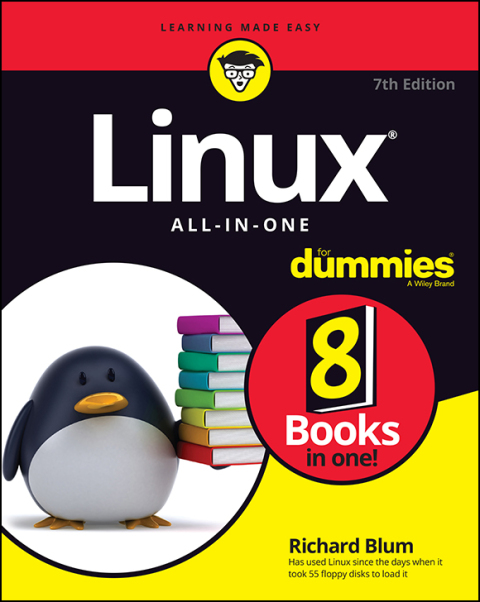Description
Efnisyfirlit
- Cover
- Title Page
- Copyright
- Introduction
- About This Book
- Foolish Assumptions
- Icons Used in This Book
- Beyond the Book
- Where to Go from Here
- Book 1: Getting Started with Linux
- Chapter 1: Introducing Linux
- What Is Linux?
- Linux Distributions: Why So Many?
- Chapter 2: Installing Linux
- Dual-Booting with Linux and Microsoft Windows
- Finally, Finally, Before You Get Started
- Installing Ubuntu
- Your First Ubuntu Boot
- Chapter 3: Living in a Virtual World
- What Are Virtual Servers?
- Installing VirtualBox
- Creating a Linux Virtual Machine
- Installing Linux on a Virtual Machine
- Chapter 4: Trying Out Linux
- Starting Linux
- Playing with the Shell
- Shutting Down
- Chapter 5: Troubleshooting and Customizing Linux
- Using Text Mode Installation
- Lookin’ for Trouble
- Resolving Other Installation Problems
- Setting Up Printers
- Managing DVDs, CD-ROMs, and Flash Drives
- Updating the Operating System
- Installing New Software
- Book 2: Linux Desktops
- Chapter 1: The GNOME Desktop
- Looking at the History of GNOME
- Breaking Down the GNOME Desktop
- Exploring the Activities Overview
- Customizing Your Ride
- Chapter 2: The KDE Plasma Desktop
- The KDE Plasma Desktop
- Using Widgets
- Plasma System Settings
- Desktop Settings
- Chapter 3: Other Popular Desktops
- Spicing Things Up with Cinnamon
- Working with MATE
- The Xfce Desktop Interface
- Chapter 4: Linux Desktop Applications
- The LibreOffice Suite
- Browsing the Web with Firefox
- Communicating with Email
- Listening to Audio
- Viewing Movie Files
- Creating and Modifying Graphics
- Chapter 5: The Linux File System
- Pieces of the Puzzle
- Touring the Linux File System
- Managing Your File System without a Net (or Mouse)
- A Permissions Primer
- Clicking Your Way through the File System
- Finding Things
- Chapter 6: Text Editors
- Viewing the Contents of a Text File
- Editing Text Files with nano
- Going with gedit
- Editing Text in the KDE Plasma Desktop
- Text Editing with ed and vi
- Book 3: Networking
- Chapter 1: Connecting to the Internet
- Understanding the Internet
- Deciding How to Connect to the Internet
- Connecting with DSL
- Connecting with a Cable Modem
- Chapter 2: Setting Up a Local Area Network
- Understanding TCP/IP
- Setting Up an Ethernet LAN
- Configuring TCP/IP Networking
- Connecting Your LAN to the Internet
- Chapter 3: Going Wireless
- Understanding Wireless Ethernet Networks
- Setting Up Wireless Hardware
- Configuring the Wireless Access Point
- Configuring Wireless Networks
- Chapter 4: Managing the Network
- Configuring Network Features
- Basic Network Troubleshooting
- Advanced Network Troubleshooting
- Book 4: Administration
- Chapter 1: Working with the Shell
- Opening Terminal Windows and Virtual Consoles
- Using the Bash Shell
- Discovering and Using Linux Commands
- Writing Shell Scripts
- Chapter 2: Introducing Basic System Administration
- Taking Stock of System Administration Tasks
- Becoming root
- Understanding How Linux Boots
- Monitoring System Performance
- Viewing System Information with the /proc File System
- Understanding Linux Devices
- Managing Loadable Driver Modules
- Scheduling Jobs in Linux
- Introducing Some GUI System Administration Tools
- Chapter 3: Managing Users and Groups
- Adding User Accounts
- Managing Groups
- Exploring the User Environment
- Changing User and Group Ownership of Files
- Chapter 4: Managing File Systems
- Exploring the Linux File System
- Sharing Files with NFS
- Accessing a DOS or Windows File System
- Mounting an NTFS partition
- Book 5: Managing Linux Servers
- Chapter 1: Hosting Internet Services
- What Is a Linux Server?
- Serving the Basics
- Serving Local Networks
- Chapter 2: Managing a Web Server
- Linux Web Servers
- The Apache Web Server
- The NGINX Server
- Chapter 3: Managing a Database Server
- Using the MySQL/MariaDB Database
- Using the PostgreSQL Database
- Chapter 4: Working with Samba and NFS
- Sharing Files with NFS
- Setting Up a Windows Server Using Samba
- Chapter 5: Managing Mail Servers
- Working with sendmail
- Working with Postfix
- A Mail-Delivery Test
- Book 6: Security
- Chapter 1: Introducing Linux Security
- Why Worry about Security?
- Establishing a Security Framework
- Securing Linux
- Delving Into Computer Security Terminology and Tools
- Keeping Up with Security News and Updates
- Chapter 2: Securing Linux
- Securing Passwords
- Protecting Files and Directories
- Encrypting and Signing Files with GnuPG
- Monitoring System Security
- Securing Internet Services
- Using Secure Shell for Remote Logins
- Setting Up Simple Firewalls
- Security Files to Be Aware Of
- Chapter 3: Vulnerability Testing and Computer Security Audits
- Understanding Security Audits
- Implementing a Security Test Methodology
- Vulnerability Testing Types
- Exploring Security Testing Tools
- Book 7: Scripting
- Chapter 1: Introductory Shell Scripting
- Trying Out Simple Shell Scripts
- Exploring the Basics of Shell Scripting
- Chapter 2: Advanced Shell Scripting
- Trying Out sed
- Working with awk and sed
- Final Notes on Shell Scripting
- Chapter 3: Programming in Linux
- An Overview of Programming
- Exploring the Software-Development Tools in Linux
- Understanding the Implications of GNU Licenses
- Book 8: Linux Certification
- Chapter 1: Studying for the Linux Professional Institute Exams
- Overview of LPI Certification Exams
- Overview of the Linux Essentials Exam
- Overview of the Linux Professionals Exams
- Chapter 2: Studying for the CompTIA Linux+ Exam
- Overview of the CompTIA Linux+ Exam
- System Management
- Security
- Scripting, Containers, and Automation
- Troubleshooting
- Chapter 3: Other Linux Certifications
- Vendor-Neutral Certifications
- Vendor-Specific Certifications
- Index
- About the Author
- Connect with Dummies
- End User License Agreement





